Wills & Probate
Texas Wills and Probate Attorney
We often hear people say that going through probate in Texas is really difficult and expensive. That can certainly be true if you die without a will – but not if you do. In fact, since Texas law strongly favors the independent administration of estates, that is, without court supervision, probate can be very simple and inexpensive – if you have a will. Although people with lots of properties and investments may benefit from custom estate planning, which could include the establishment of one or more trusts, simple estates often need nothing more than a Last Will and Testament.
And no one should be without a Statutory Durable Power of Attorney, an Advanced Directive and Medical Power of Attorney, a Declaration of Guardian for Minor Children, or a Declaration of Guardian.
For simple estates we typically prepare these five documents for less than $1,000.
Statutory Durable Power of Attorney
A Statutory Durable Power of Attorney authorizes someone (called an “Agent”) to handle your financial affairs should you be unable to do so.
Combination Medical Directive, Medical Power of Attorney, and HIPAA Release Authorization
A Medical Directive sets forth your wishes regarding terminal and irreversible conditions; this is sometimes called a “Living Will.” The Medical Power of Attorney designates someone to make health care decisions for you, should you become unable to do so. The HIPAA Release Authorization is a document required by federal law in order for your health care providers to discuss your condition with others. We combine these into a single document.
Declaration of Guardian for Minor Children
If you are your children’s last surviving parent and you die, or you become completely and permanently incapacitated, a “Declaration of Guardian of My Minor Children” tells the probate judge who you want to act as your minor children’s guardian. Without such a Declaration judges won’t appoint a guardian without costly and time consuming legal procedures.
Declaration of Guardian
If you become completely and permanently incapacitated a “Declaration of Guardian” tells the probate judge who you want to act as your guardian. Without a Declaration of Guardian, judges won’t appoint a guardian for you without costly and time consuming legal procedures (so the judge can be satisfied that no one is trying to take advantage of you).
Last Will & Testament
Everyone should have one. For small estates, the simpler the better.
Probate
If someone dies without a will, called dying “intestate,” and their heirs dispute how their estate is to be divided, the heir will have to file what is called an Heirship Proceeding. The probate judge will then appoint an attorney to represent any unknown heirs. Once that attorney finishes their investigation into whether there are any heirs not identified by the heirs who filed the case, and files a report with the judge, the judge will typically appoint an administrator to gather and account for the decedent’s property, satisfy any unpaid debts of the estate, and file an accounting. But in this type of a proceeding, called a Dependent Administration, the appointed administrator must get the judge’s approval before disposing of any property or satisfying any debts. Needless to say, probate proceedings for estates of decedents who died without a will are far more complex and expensive than for those who died with a Will.





